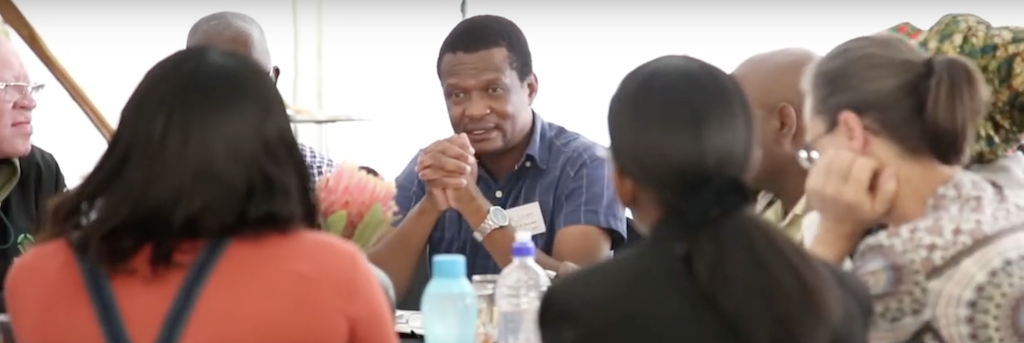Latest Resources

29 May 2019
ACB’s Commentary on An Africa-Europe Agenda for Rural Transformation: Report by the Task Force Ru...
The European Union (EU) is in the process of defining a new set of priorities in the African agricultural and food sectors, through the proposed implementation of the EU-Africa Alliance for Sustainable Investment and Jobs. Their Task Force for Rural Africa published a report with draft recommendations, which is oriented towards promoting the capitalist transformation […]

16 April 2019
Agroecology as an alternative (Video four of a four-part series)
In August 2018, the Rural Women’s Assembly (RWA) and the African Centre for Biodiversity (ACB) hosted a speak-out for SADC smallholder farmers in Windhoek, Namibia, on Farm Input Subsidy Programmes (FISPs). FISPs are government agricultural programmes that promote Green Revolution inputs produced by multinational corporations, such as chemical fertilizers. In Ghana, for example, up to […]

20 March 2019
Alternatives to FISP: Farm Input Subsidy Programmes in Africa
In August 2018, the Rural Women’s Assembly (RWA) and the African Centre for Biodiversity (ACB) hosted a speak-out for SADC smallholder farmers in Windhoek, Namibia, on Farm Input Subsidy Programmes (FISPs). FISPs are government agricultural programmes that promote the use of Green Revolution inputs produced by multinational corporations. These top-down packages have proven to be […]

13 March 2019
Experiences of FISP: Farm Input Subsidy Programmes in Africa
In August 2018, the Rural Women’s Assembly (RWA) and the African Centre for Biodiversity (ACB) hosted a speak-out for SADC smallholder farmers in Windhoek, Namibia, on Farm Input Subsidy Programmes (FISPs). FISPs are government agricultural programmes that promote the use of Green Revolution inputs produced by multinational corporations. Farmers were not properly consulted about their […]

5 March 2019
WHY FARMERS FIND FISP PROBLEMATIC (Part 1 of 4 videos)
In August 2018, The Rural Women’s Assembly (RWA) and the African Centre for Biodiversity (ACB) hosted a speak-out with SADC smallholder farmers in Windhoek, Namibia, on Farm Input Subsidy Programmes (FISPs). FISPs are government agricultural programmes to promote the use of Green Revolution inputs (hybrid seed, synthetic fertilizer and agro-chemicals) produced by multinational corporations. WHY […]

15 October 2018
Three animations on GMOs in South Africa
The African Centre for Biodiversity (ACB) is pleased to share with you a three part animation series on GMOs in South Africa. These animations (each around 5 minutes long) are available on our YouTube Channel. The animations speak to the following topics: History of Maize Cultivation and Consumption in South Africa GMOs in South Africa […]

13 August 2018
Farm input subsidy programme (FISP) info pamphlet
This pamphlet offers a quick background on the FISPs and the key issues and concerns. It explains what FISPs are, their aims, why the FISPs are failing to meet their objectives, how they promote small-scale farmer dependency, and ways of transitioning out of FISPs towards more appropriate forms of smallholder farmer support. African Centre for […]

6 July 2018
Smallholder Farmer Autonomy Over Seed Production
At the National Seed Dialogue and Celebration, hosted by the African Centre for Biodiversity at Constitution Hill in December 2017, participants shared their experiences and discussed options and priorities. Smallholder Farmer Autonomy Over Seed Production is the final video in a series of six from the ACB hosted event. Smallholder farmers feed the world, providing […]

22 June 2018
Value of Household and Community Seed Banks
In South Africa, different initiatives are under way to build farmer-based seed bank networks both in the public sector and by civil society. At the National Seed Dialogue and Celebration, hosted by the African Centre for Biodiversity at Constitution Hill in December 2017, participants shared their experiences and discussed options and priorities. This is the […]

31 May 2018
Participatory Plant Breeding and Smallholder Farmers
The National Seed Dialogue and Celebration was hosted by the African Centre for Biodiversity at Constitution Hill in December 2017. The third video in this series, Participatory Plant Breeding and Smallholder Farmers looked at issues of smallholder farmers & seed breeding/crop improvement and the potential roles of smallholder farmers in these processes were discussed. Since […]
